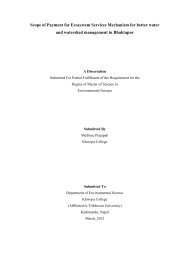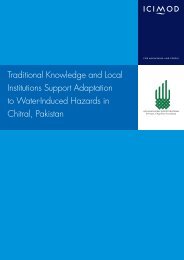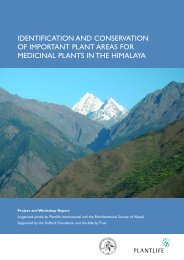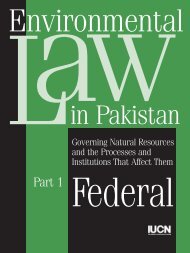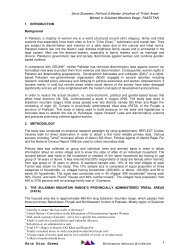Flash Flood Risk Management â A Training of Trainers ... - ReliefWeb
Flash Flood Risk Management â A Training of Trainers ... - ReliefWeb
Flash Flood Risk Management â A Training of Trainers ... - ReliefWeb
Create successful ePaper yourself
Turn your PDF publications into a flip-book with our unique Google optimized e-Paper software.
<strong>Flash</strong> <strong>Flood</strong> <strong>Risk</strong> <strong>Management</strong> – A <strong>Training</strong> <strong>of</strong> <strong>Trainers</strong> Manual<br />
Session 17 Resource Materials<br />
RM 17.1: Role <strong>of</strong> law in flood management<br />
‘Disaster risk management is the process <strong>of</strong> implementing those policies, institutions and<br />
investments to strengthen the coping capacities <strong>of</strong> society to reduce the impacts <strong>of</strong> natural hazards<br />
and related environmental and technological disasters.’ (UNISDR 2009)<br />
Integrated flood management should be based on a legal framework and supported by solid institutional<br />
arrangements. A legal mechanism is very important because many governmental and non-governmental<br />
organisations at the national, subnational, and local levels are involved in flood management. In this context,<br />
laws work to provide the framework for implementing governmental policies for flood management.<br />
The law has three distinct roles as outlined in Figure 26.<br />
• Law defines institutional roles and responsibilities<br />
• It protects the rights and determines the obligations <strong>of</strong> institutions and individuals.<br />
• If conflicts cannot be avoided, the law provides a mechanism for dispute resolution through the judicial<br />
system.<br />
These legal provisions are essential to ensure that government agencies have specific responsibilities<br />
for addressing aspects <strong>of</strong> flood management and can be held accountable. Laws define the rights and<br />
obligations <strong>of</strong> different institutions and individuals at all stages <strong>of</strong> flood management. Laws are also essential<br />
in giving flood managers the legal powers they need to intervene during a flood event, such as right <strong>of</strong><br />
access to private property.<br />
A legal framework at the national level should address issues related to:<br />
• coordination and cooperation among organisations, institutions, sectors, and beneficiaries;<br />
• availability and accessibility <strong>of</strong> the basic data and information needed for decision making;<br />
• building and enabling a conducive environment for all stakeholders to participate and make collective<br />
decisions.<br />
Figure 26: The role <strong>of</strong> law in IFM<br />
session 17<br />
Stakeholders<br />
Scientists<br />
Policy<br />
Implementation<br />
Water<br />
resource<br />
managers<br />
Law<br />
Defines institutional<br />
roles and responsibilities<br />
Provides mechanisms for<br />
dispute management<br />
Determines and protects<br />
rights and obligations<br />
Source: WMO (2006)<br />
122



